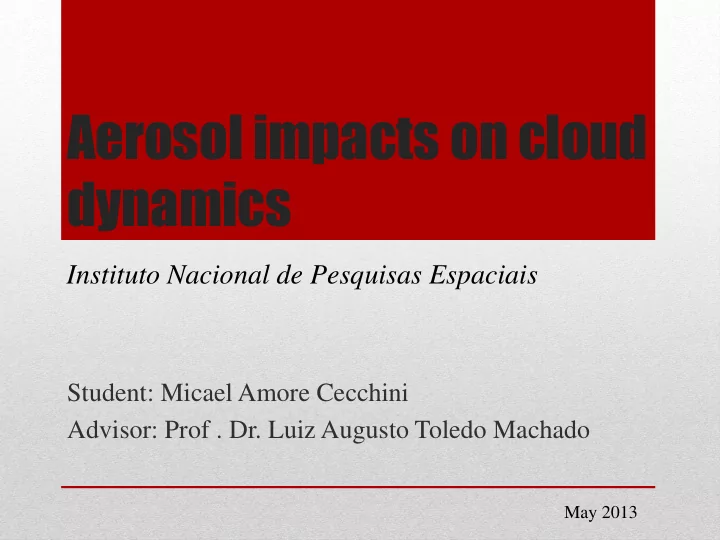

Aerosol impacts on cloud dynamics Instituto Nacional de Pesquisas Espaciais Student: Micael Amore Cecchini Advisor: Prof . Dr. Luiz Augusto Toledo Machado May 2013
• Assess if it’s possible to observe aerosols impacts on precipitation characteristics through ground based measurements • Analyze its significance Objectives
• Measurements site: CHUVA container at IEAv, Vale do Paraíba • CCNC • CPC • Joss • Meteorological station Instrumentation
• Measurement period -> Nov/22/2011 through Jan/10/2012 • DSD parameterization -> Tokay and Short (1996) and Tokay et al. (2001): • 𝑂 𝐸 = 𝑂 0 𝐸 𝑛 exp(−Λ𝐸) 3 11𝐻−8+[𝐻 𝐻+8 ] 1/2 𝑁 4 • 𝑛 = , 𝐻 = [N 0 ] = mm -1- m m -3 2 𝑁 6 2(1−𝐻) 𝑁 3 [ m ] = [] [ Λ ] = mm -1 𝛭 𝑛+4 𝑁 3 • 𝑂 0 = 𝛥(𝑛+4) (𝑛+4)𝑁 3 (𝑛+4) 𝑁 4 • 𝛭 = = 𝐸 𝑛 , 𝐸 𝑛 = 𝑁 3 𝑁 4 ∞ 𝐸 𝑦 𝑂 𝐸 𝑒𝐸 • Where 𝑁 𝑦 = 0 Methodology
• Rain Intensity: • 𝑆𝐽 = 6𝜌 × 10 −6 ∞ 𝑊 𝐸 𝐸 3 𝑂 𝐸 𝑒𝐸 0 • Total droplet concentration: ∞ • TDC = 𝑂 𝐸 𝑒𝐸 0 • Cluster analysis applied to m , N 0 and Λ • k-means method - Kanungo et. al (2002) Methodology
Mean CCN diurnal cycle (local time) 4000.00 3500.00 3000.00 2500.00 1% 0,8% 2000.00 0,6% 0,4% 1500.00 0,2% 1000.00 500.00 0.00 0 1 2 3 4 5 6 7 8 9 10 11 12 13 14 15 16 17 18 19 20 21 22 23 CCN 1.0 ~200 to ~10.000 cm -3 CN ~400 to 70.000 cm -3 Results
CCN/CN CCN CN Results
R 2 = 0,9996 Results
-> Adjustments to parameters values ( m /2 and 2*log(N 0 )) -> supervised k-means -> Centroid number chosen to best represent DSD data Results
Λ (mm -1 ) # Cluster N 0 (mm -1- m m -3 ) m RI (mm/h) Rain Accum. (mm) Frequency (%) 1 1.31E+15 25.63 30.18 0.35 1.62 (0.62%) 2.83 2 9.64E+09 16.40 17.52 1.39 4.59 (1.75%) 5.94 3 2.66E+07 10.63 11.69 1.81 11.21 (4.28%) 13.49 4 6.03E+05 7.78 8.20 2.33 29.14 (11.14%) 21.32 5 3.77E+04 5.18 5.52 3.70 82.38 (31.48%) 30.15 6 4.85E+01 14.65 6.20 2.81 5.87 (2.24%) 2.78 7 2.49E+03 3.25 3.30 6.28 126.86 (48.48%) 23.49 1,2,3 -> Stratiform clusters 4 -> Transition cluster 5,6,7 -> Convective cluster Results
Results
-> Daily pattern classification based on Δ T, Δ CCN 1.0 , rain accumulated, Ri m and duration -> Local Convection, Stratiform Rain and Organized Convection Results
Cluster Frequency (%) ± Standard Deviation (%) Daily Transition Stratiform Clusters Convective Clusters Pattern Cluster 1 2 3 4 5 6 7 Stratiform 21 ± 29 24 ± 11 19 ± 8 13 ± 11 12 ± 12 0 ± 0 11 ± 12 Rain Local 1 ± 2 3 ± 4 11 ± 8 13 ± 8 22 ± 13 7 ± 9 43 ± 17 Convection Organized 4 ± 8 7 ± 7 19 ± 16 19 ± 11 24 ± 15 8 ± 11 19 ± 15 Convection Results
• Events separation: • Interval ≥ 20 min between two DSD data • CCN: 2 hours means, 30 minutes before rain starts • Mean DSD calculated for each event • Only the first event on each day was selected, avoiding rainout and washout effects • 16 events, total • 5 Local Convection, 5 Stratiform Rain, 6 Organized Convection • Polluted X pristine pairs Results
250.00 18.00 Concentration (mm -1 m -3 ) 16.00 Concentration (%) 200.00 14.00 12.00 150.00 10.00 8.00 Polluted Polluted 100.00 6.00 Pristine Pristine 4.00 50.00 2.00 0.00 0.00 0.0 0.5 1.0 1.5 2.0 2.5 3.0 3.5 4.0 4.5 5.0 5.5 6.0 0.0 0.5 1.0 1.5 2.0 2.5 3.0 3.5 4.0 4.5 5.0 5.5 6.0 Diameter (mm) Diameter (mm) Pristine Polluted 0.02 0.05 0.00 0.03 1 1 0.09 2 2 0.25 3 0.19 3 0.11 4 0.01 4 0.51 0.16 5 0.21 5 0.27 6 6 7 7 0.09 CCN=4156 cm -3 RI=20.34 mm/h CCN=1849 cm -3 RI=19.20 mm/h D m =2.69 mm TDC=216 m -3 D m =2.44 mm TDC=280 m -3 Results Bold - Significant (T-Student)
600.00 20.00 Concentration (mm -1 m -3 ) Concentration (%) 500.00 15.00 400.00 10.00 300.00 Polluted Polluted 200.00 5.00 Pristine Pristine 100.00 0.00 0.00 0.0 0.5 1.0 1.5 2.0 2.5 3.0 3.5 4.0 4.5 5.0 5.5 6.0 0.0 0.5 1.0 1.5 2.0 2.5 3.0 3.5 4.0 4.5 5.0 5.5 6.0 Diameter (mm) Diameter (mm) Pristine Polluted 1 0.00 1 2 0.12 0.00 2 0.12 0.28 0.09 3 0.13 0.25 3 0.03 4 4 0.15 5 0.16 0.17 5 6 0.16 0.35 6 7 7 CCN=668 cm -3 RI=2.45 mm/h CCN=2012 cm -3 RI=2.65 mm/h D m =1.30 mm TDC=301 m -3 D m =1.22 mm TDC=388 m -3 Results
• CCN concentrations between rural and urban levels • Mean CCN 1.0 ~ 2000 cm -3 • Clear diurnal cycle and dependent on local circulation • Effective momentum DSD parameterization • Cluster analysis – DSD patterns identification • Stratiform rain: CCN (201%) -> D m (6%); TDC (29%) • Local Convection: CCN (125%) -> D m (10%); TDC (23%) • CCN favored convective characteristics on Local Convection cases and stratiform features on Stratiform Rain • CCN x DSD -> restrictive analysis, more data needed! Conclusions
Recommend
More recommend